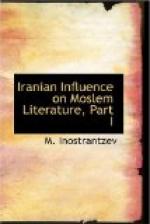[Sidenote: Maritime commerce.]
“As to the manners of the people in Fars those who are the chief men and occupy the higher offices in the service of the sovereign are polite and courteous. They have fine palaces and are very hospitable. The people in general, are kind and civil in their manners. The merchants are remarkably covetous and desirous of wealth. I have heard that there was a certain man of Siraj who had forty years at sea never leaving his ship during this time. Whenever he came to a port he sent some of his people on shore to transact his commercial affairs, and when the business was finished he sailed on to some other place. The inhabitants of Siraj devoted their whole time to commerce and merchandise. I myself saw at this place several persons who possessed 4,000 thousand dinars and there were some who had still more and their clothes were those of labourers.
[Sidenote: Parsis in Fars.]
“In Fars there are fire worshippers, Guebres, and Christians and some Jews. And the practices of the Guebres, their fire temples, and their customs and ceremonies and Guebreism or Magism, still continue among the people of Fars and there are not in, any country of Islam so many Guebres as in the land of Fars. It has been their capital or residence.”
[Like all other Arab authors Ibn Haukal mentions the celebrated men belonging to each of the provinces he describes. Among the celebrities of Fars are reckoned Hormuz, “Guebre”, who in the time of Omar was taken by Abdulla Ibn Omar and put to death; and Salman Farsi who was one of the illustrious men. His piety is celebrated throughout the world. He sought the truth of religion in all quarters only to find it at Medina with the Prophet. In consequence of this Selman became a true believer. Abdulla Ibn Mukaffa also belonged to Fars. In the territory of Istakhar is a great building with statuettes carved in stone and there also are inscriptions and paintings.]
APPENDIX VIII
IBN KHALLIKAN
BIOGRAPHICAL DICTIONARY
TRANSLATED BY DE SLANE, VOL, I.
Dehkan is a Persian word signifying both a farmer and a historian. It is generally used to designate a person of ancient Persian family possessing hereditary landed property. (P. 77).
Ispeh Salar. This word signifies commander of the troops. (P. 228). KATIBS or writers were the persons employed in public offices: the directors, clerks and secretaries in government service were all called katib.
[Sidenote: Nauruz in Baghdad.]
Khalifs’ Nauruz.—This another name for Nauruz Khasa “New Year’s day proper,” in which it was customary to offer presents to the sovereign. This festival was held on the sixth day of the month of Ferwardin (end of Marob). The old Persian custom of celebrating Nauruz existed at Baghdad under the Abbaside Khalifs. (See P. 203 of this work, see also an anecdote of Ahmed Ibn Yusuf al Khatif in his life of Al Mubarad.) (P. 340).




